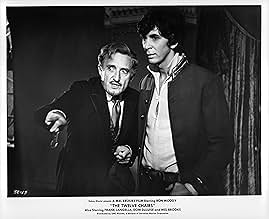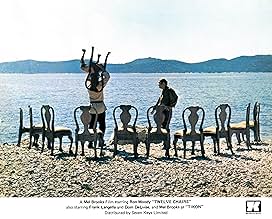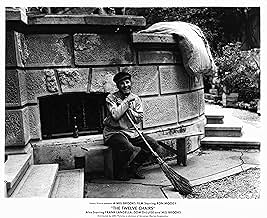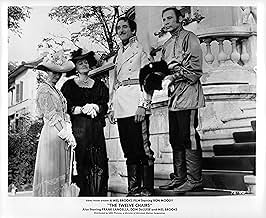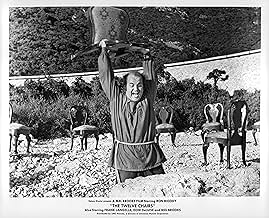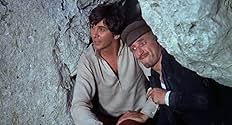IMDb-BEWERTUNG
6,4/10
7466
IHRE BEWERTUNG
Füge eine Handlung in deiner Sprache hinzuIn 1920s Soviet Russia, a fallen aristocrat, a priest and a con artist search for a treasure of jewels hidden inside one of twelve dining chairs, lost during the revolution.In 1920s Soviet Russia, a fallen aristocrat, a priest and a con artist search for a treasure of jewels hidden inside one of twelve dining chairs, lost during the revolution.In 1920s Soviet Russia, a fallen aristocrat, a priest and a con artist search for a treasure of jewels hidden inside one of twelve dining chairs, lost during the revolution.
- Auszeichnungen
- 1 Gewinn & 1 Nominierung insgesamt
Andréas Voutsinas
- Nikolai Sestrin
- (as Andreas Voutsinas)
Mladen 'Mladja' Veselinovic
- Peasant
- (as Mladja Veselinovic)
Petar Banicevic
- Sergeant
- (Nicht genannt)
Dejan Cavic
- Orator
- (Nicht genannt)
Empfohlene Bewertungen
I rented this film because it was the only Mel Brooks movie I hadn't seen. I had enjoyed all of his other movies and thought,"Why not see 'em all?" I thought since I hadn't heard of it it would be stupid. And, Man, was I wrong. This movie could be described as hilarious. I loved it. And it's not exactly like all other Mel Brooks movies. If you like Mel Brooks I recommend this film to you. Dom DeLuise is hilarious in this. Now go watch it with your family.
In his lifetime Mel Brooks has created many motion pictures which have established him as an artistic genius. "The Twelve Chairs" is another milestone for him. From the very beginning of this film, to its ending, there is a sense of serious, but humanistic brilliance. The era is the aftermath of the Russian Revolution and a dying woman wants to clear her conscience and reveal her greatest sin. As thousands of the nobility are fleeing for their lives, she decides to hide her family's fortune inside the lining of a set of handcrafted chairs. That secret is her dying revelation and is said unfortunately into more than one set of ears. This initiates a mad dash for the lost treasure. Seeking the cache of jewels are three intrepid, but greedy set of characters. The first is incredibly talented Ron Moody who adroitly and brilliantly plays the legitimate, greedy and opportunistic son, Ippolit Vorobyaninov. Once a Marshall of the nobility, he is now reduced to a minor banking clerk and opportunistic son-in-law. Frank Langella is superior as Ostap Bender, a handsome, street-wise, traveling Gypsy, who also wants in on the treasure hunt. Finally there is Dom DeLuise who plays Father Fyodor, an Orthodox but impoverished monk who believes, God will help him find the elusive chair first. What the trio soon discover is that the chair is one of Twelve which have been scattered across the vast twelve thousand miles of Russia. If Mel Brooks sought to create an amusing memorable movie, he succeeded. By the time one reaches the end of this film, we realize . . . . a Classic has been born. ****
THE TWELVE CHAIRS is a different kind of Mel Brooks comedy. Its story, from a Russian novel by Ilf and Petrov, will seem very tasteful and human to those who are acquainted with Brooks' usual raunchiness. This movie is a nice change. Ron Moody and Frank Langella star, with Dom DeLuise and a special appearance by Mel Brooks as Tikon.
As Mel Brooks films go, I rate it second only to Young Frankenstein. The action takes place in Russia 10 years after the Revolution. Ron Moody is marvelous as a low IQ and totally inept former nobleman, now hiding out as a clerk in a government office, who learns that the family jewels had been sewn into one of the 12 dining room chairs. He returns to his former residence, now an old folks home, and learns from former servant, now janitor, Mel Brooks that the chairs are gone, confiscated by the government. Con man Frank Langella threatens to turn Moody in if he does not allow him in on the quest. Of course, the chairs have been widely distributed. A major fly in the ointment is Dom Deluise, the village priest, who has also learned the secret. He relinquishes all for greed ("O, Thou who knowest all---you know.") and competes in the search. Not a perfect movie, but loaded with laughs. May be Dom's funniest role. I give it an 8 out of 10.
It is the forgotten Brooks movie. Probably because it has the most controlled script story, and had the least wild, satyric inventiveness of any of his films.
After he wrote and directed the original THE PRODUCERS, Brooks did not do another film for a few years. The second one was this one set in the post-Russian Revolution period in the Soviet Union. Ron Moody (Fagin in the musical OLIVER) is a minor Tsarist nobleman who discovers, when attending his mother-in-law on her death bed, that she hid her fortune in jewelry in one of the dining room chairs. There were a set of twelve chairs, and they were appropriated by the government to be given to deserving members of the proletariat. Moody discovers that his mother-in-law did confess this to one person besides him: the local Russian Orthodox Priest (Dom DeLuise). Moody finds the latter a difficult opponent to beat to the fortune first. By chance he falls in with a young swindler (Frank Langella) and he and Langella pursue the chairs, and also send DeLuise on a wild goose chase following a second set of similar chairs.
What we get is a view of the Soviet Union in 1928, as the Civil Wars died out and the regime consolidated power. Trotsky's name is now dismissed (as a street shows). The stage is dominated by the state oriented drama that is anti-capitalist. Witness the performance of Andreas Voutsinas - the original "Carmen Ghia" in the first PRODUCERS, as the government backed manager of the theater group that Moody and Langella join. There is a life and death threat behind comments he gives to one of the stage crew he controls. We also see how the common people try to cope with the changes - being sent across country on government sponsored jobs - to houses that the government may furnish.
Brooks has his first role in his own films in this one - as Tikhon, the drunken, ex-servant of Moody. He receives a slap from the latter, and considers it exactly like a hug.
Like IT'S A MAD, MAD, MAD, MAD WORLD, THE TWELVE CHAIRS looks at the antics people will go through for hidden wealth. Langella, who is a street criminal anyway, is the only sane member of the three treasure seekers. He is a realist (the first really serious one in Brooks' films), and has adapted to the new conditions fairly easily by living on his considerably keen wits. He realizes that he is hampered as well as helped by his alliance with Moody, but manages to figure out how to live with Moody as best as possible. Moody has become a bureaucrat to survive in the new regime (he's suspect as an aristocrat), but he still has his pretenses. It takes the events he shares with Langella for him to finally give up his pretenses. Together both men find out what is really worthwhile about living. DeLuise is less lucky. He just discovers the perils of being a loner.
After he wrote and directed the original THE PRODUCERS, Brooks did not do another film for a few years. The second one was this one set in the post-Russian Revolution period in the Soviet Union. Ron Moody (Fagin in the musical OLIVER) is a minor Tsarist nobleman who discovers, when attending his mother-in-law on her death bed, that she hid her fortune in jewelry in one of the dining room chairs. There were a set of twelve chairs, and they were appropriated by the government to be given to deserving members of the proletariat. Moody discovers that his mother-in-law did confess this to one person besides him: the local Russian Orthodox Priest (Dom DeLuise). Moody finds the latter a difficult opponent to beat to the fortune first. By chance he falls in with a young swindler (Frank Langella) and he and Langella pursue the chairs, and also send DeLuise on a wild goose chase following a second set of similar chairs.
What we get is a view of the Soviet Union in 1928, as the Civil Wars died out and the regime consolidated power. Trotsky's name is now dismissed (as a street shows). The stage is dominated by the state oriented drama that is anti-capitalist. Witness the performance of Andreas Voutsinas - the original "Carmen Ghia" in the first PRODUCERS, as the government backed manager of the theater group that Moody and Langella join. There is a life and death threat behind comments he gives to one of the stage crew he controls. We also see how the common people try to cope with the changes - being sent across country on government sponsored jobs - to houses that the government may furnish.
Brooks has his first role in his own films in this one - as Tikhon, the drunken, ex-servant of Moody. He receives a slap from the latter, and considers it exactly like a hug.
Like IT'S A MAD, MAD, MAD, MAD WORLD, THE TWELVE CHAIRS looks at the antics people will go through for hidden wealth. Langella, who is a street criminal anyway, is the only sane member of the three treasure seekers. He is a realist (the first really serious one in Brooks' films), and has adapted to the new conditions fairly easily by living on his considerably keen wits. He realizes that he is hampered as well as helped by his alliance with Moody, but manages to figure out how to live with Moody as best as possible. Moody has become a bureaucrat to survive in the new regime (he's suspect as an aristocrat), but he still has his pretenses. It takes the events he shares with Langella for him to finally give up his pretenses. Together both men find out what is really worthwhile about living. DeLuise is less lucky. He just discovers the perils of being a loner.
Wusstest du schon
- WissenswertesMel Brooks had problems with Yugoslavian extras who didn't speak English. In one scene, extras playing museum guards were supposed to walk through a museum, ringing hand bells and shouting, "Closing time! Closing time!" Instead, the extras misunderstood and shouted, "Cloakie Bye! Cloakie Bye!" Brooks decided "Cloakie Bye" was funnier, so he left it in the movie.
- PatzerDuring the chase through the train yard, a modern era bus can be seen passing in the background.
- Zitate
Ostap Bender: [after yet another failure] Remember the famous Russian proverb: "The hungrier you get, the tastier the meal." On the other hand, the French have a proverb: merde!
- Crazy CreditsIn the opening credits the title of the movie is showed in Russian first (even with a typographic error 'Dvenadzat' stchlyev'), then it changes into the english title. The same happened at the end of the credits with the words "The end" (Konez), first cames the Russian word, than the english translation.
- SoundtracksHope for the Best, Expect the Worst
Music by Johannes Brahms ("Hungarian Dance No. 4 in F# minor") and lyrics by Mel Brooks
Top-Auswahl
Melde dich zum Bewerten an und greife auf die Watchlist für personalisierte Empfehlungen zu.
- How long is The Twelve Chairs?Powered by Alexa
Details
Box Office
- Bruttoertrag in den USA und Kanada
- 1.806.258 $
Zu dieser Seite beitragen
Bearbeitung vorschlagen oder fehlenden Inhalt hinzufügen


